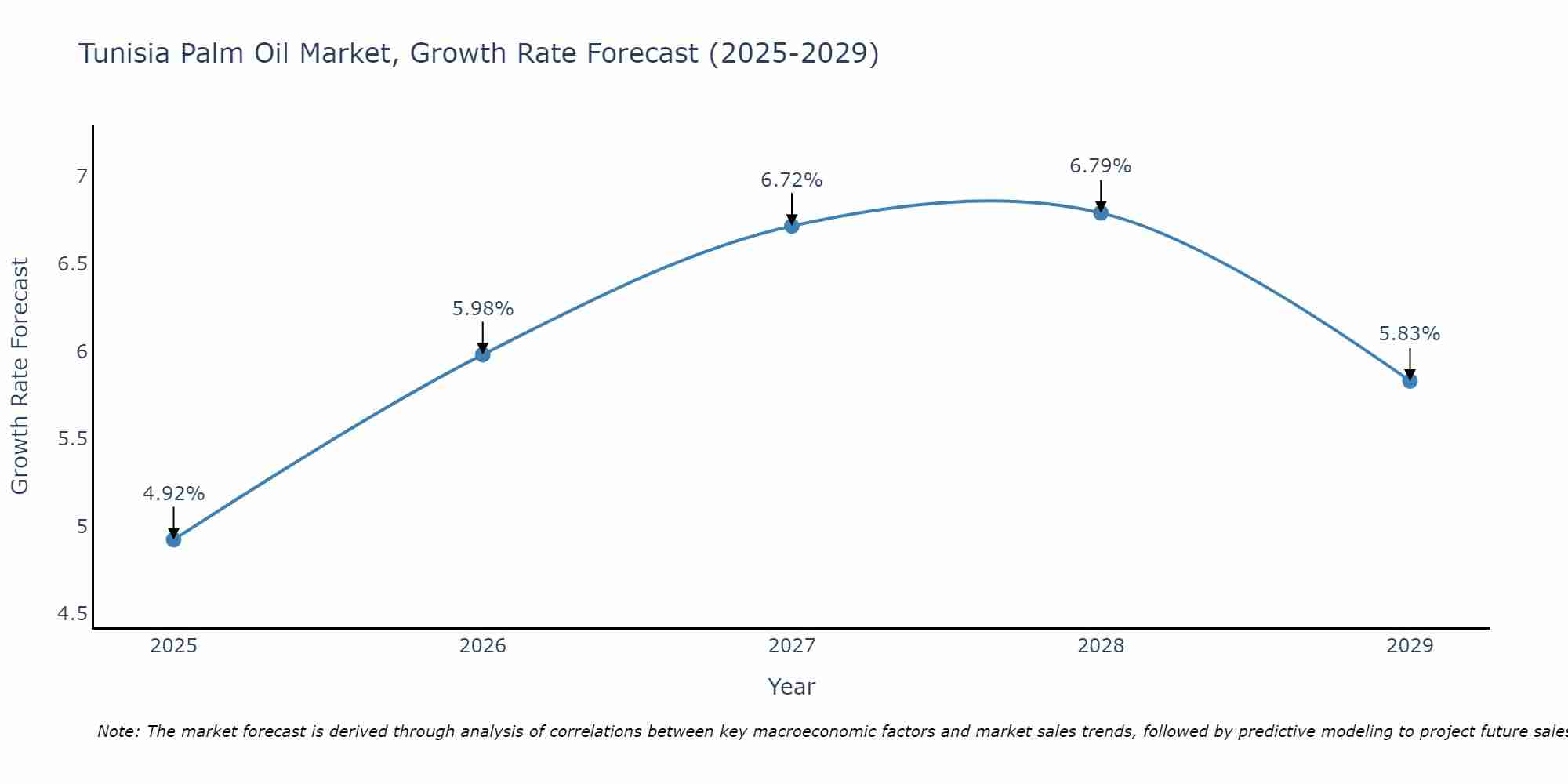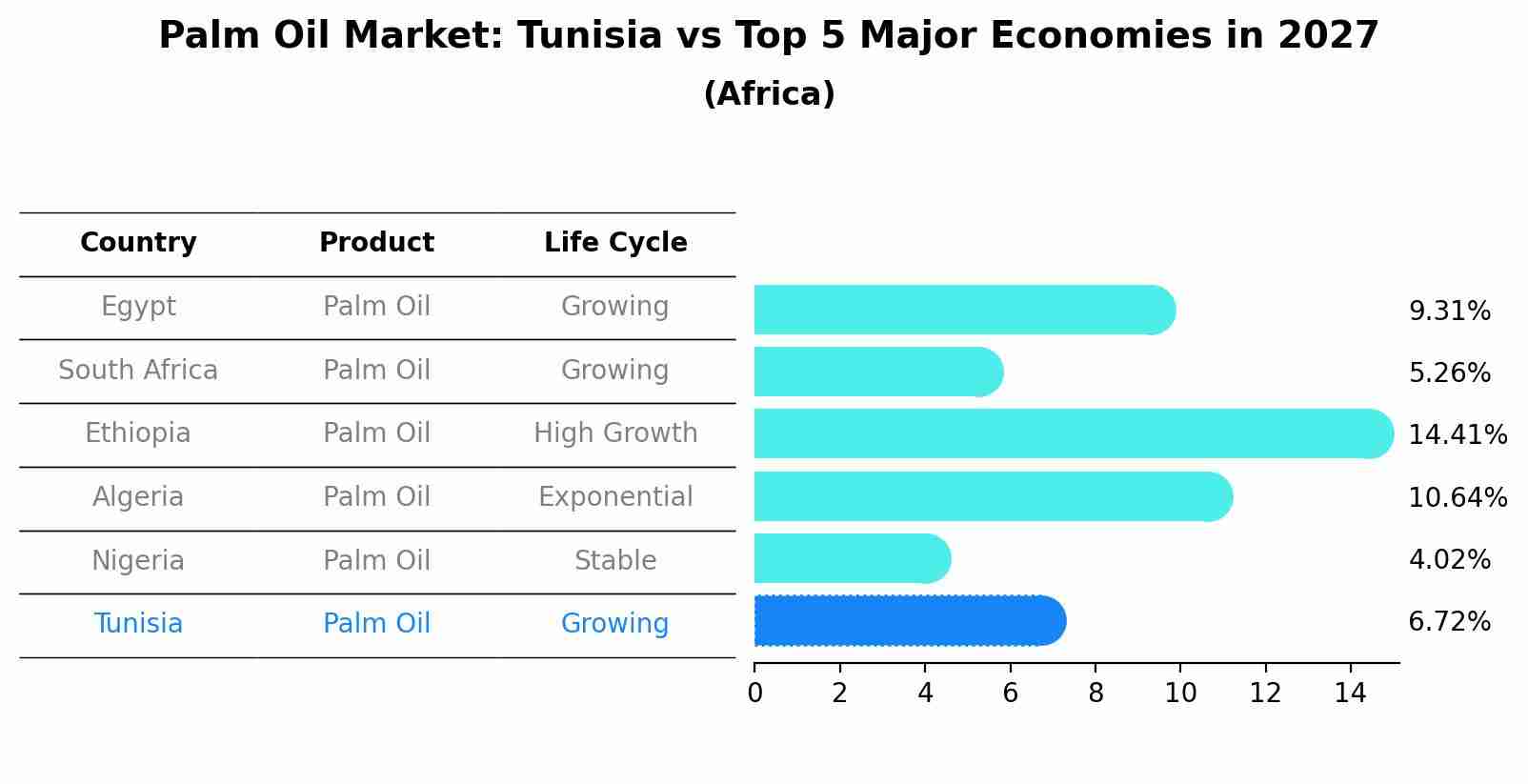Tunisia Palm Oil Market Outlook | Analysis, Companies, Industry, Value, COVID-19 IMPACT, Revenue, Forecast, Share, Growth, Trends & Size
| Product Code: ETC383814 | Publication Date: Aug 2022 | Updated Date: Jul 2025 | Product Type: Market Research Report | |
| Publisher: 6Wresearch | Author: Shubham Padhi | No. of Pages: 75 | No. of Figures: 35 | No. of Tables: 20 |
Tunisia Palm Oil Market Size Growth Rate
The Tunisia Palm Oil Market is projected to witness mixed growth rate patterns during 2025 to 2029. The growth rate begins at 4.92% in 2025, climbs to a high of 6.79% in 2028, and moderates to 5.83% by 2029.

Palm Oil Market: Tunisia vs Top 5 Major Economies in 2027 (Africa)
Tunisia's Palm Oil market is anticipated to experience a growing growth rate of 6.72% by 2027, reflecting trends observed in the largest economy Egypt, followed by South Africa, Ethiopia, Algeria and Nigeria.

Tunisia Palm Oil Market Synopsis
The Tunisia palm oil market is experiencing steady growth driven by increasing demand from various industries such as food processing, cosmetics, and biodiesel production. While Tunisia does not produce palm oil domestically, it heavily relies on imports to meet its consumption needs. The country`s palm oil consumption has been on the rise due to its affordability, versatility, and long shelf life. However, there is a growing concern among consumers and environmental groups regarding the sustainability and environmental impact of palm oil production. This has led to a shift towards sustainable sourcing practices and an increasing preference for certified sustainable palm oil products in the Tunisian market. Overall, the Tunisia palm oil market presents opportunities for both domestic consumption and potential investments in sustainable sourcing practices.
Tunisia Palm Oil Market Trends
In the Tunisia Palm Oil Market, there is a growing trend towards sustainable sourcing and production practices. Consumers are increasingly concerned about the environmental and social impact of palm oil production, leading to a demand for products that are certified as sustainable. This has led to a shift among companies towards using certified sustainable palm oil in their products or opting for alternative oils. Additionally, there is a rising awareness of the health implications of consuming palm oil due to its high saturated fat content, prompting some consumers to seek healthier alternatives. Overall, the market is witnessing a movement towards transparency, sustainability, and health-conscious choices in the palm oil sector.
Tunisia Palm Oil Market Challenges
In the Tunisia Palm Oil Market, challenges arise from factors such as fluctuating global palm oil prices, competition from other vegetable oils, environmental concerns related to deforestation for palm oil plantation expansion, and consumer preferences for sustainable and healthier alternatives. Additionally, regulatory constraints and trade policies can impact the importation and pricing of palm oil in Tunisia. The market also faces pressure from advocacy groups and consumers demanding transparency and ethical sourcing practices in the palm oil supply chain. To navigate these challenges, companies operating in the Tunisia Palm Oil Market need to focus on sustainability initiatives, product differentiation, and market diversification strategies to ensure long-term growth and competitiveness in the industry.
Tunisia Palm Oil Market Investment Opportunities
The Tunisia palm oil market presents promising investment opportunities due to increasing demand for palm oil in various industries such as food, cosmetics, and biofuels. With Tunisia being a net importer of palm oil, there is potential for local production to meet the domestic demand and reduce import dependence. Investing in palm oil plantations or processing facilities in Tunisia could provide significant returns, especially with government support for agricultural projects and potential export opportunities within the region. Additionally, sustainable palm oil production practices could appeal to environmentally conscious consumers and investors. However, it is essential to consider factors like land availability, regulatory environment, and market dynamics before making investment decisions in the Tunisia palm oil market.
Jordan Agar Market Government Policies
The Tunisian government has implemented various policies related to the palm oil market, aiming to promote local production and reduce dependence on imports. One significant policy is the establishment of subsidies and incentives for domestic palm oil producers, including financial support and technical assistance. Additionally, the government has imposed regulations to ensure the sustainable production and processing of palm oil, in line with environmental and social standards. Furthermore, there are restrictions on the importation of palm oil to protect local producers and promote self-sufficiency. Overall, these policies reflect Tunisia`s commitment to developing a competitive and sustainable palm oil industry while safeguarding the interests of local producers and consumers.
Tunisia Palm Oil Market Future Outlook
The Tunisia Palm Oil Market is expected to show steady growth in the coming years due to increasing consumer demand for versatile and cost-effective cooking oil. However, sustainability concerns and environmental awareness may lead to a shift towards more sustainable alternatives such as olive oil. The government`s initiatives to promote domestic production of edible oils and reduce reliance on imports could also impact the market dynamics. Overall, while the demand for palm oil is likely to remain strong in Tunisia, there may be a growing emphasis on sustainable sourcing and production methods in the future, influenced by global trends and consumer preferences.
Key Highlights of the Report:
- Tunisia Palm Oil Market Outlook
- Market Size of Tunisia Palm Oil Market, 2021
- Forecast of Tunisia Palm Oil Market, 2031
- Historical Data and Forecast of Tunisia Palm Oil Revenues & Volume for the Period 2018 - 2031
- Tunisia Palm Oil Market Trend Evolution
- Tunisia Palm Oil Market Drivers and Challenges
- Tunisia Palm Oil Price Trends
- Tunisia Palm Oil Porter's Five Forces
- Tunisia Palm Oil Industry Life Cycle
- Historical Data and Forecast of Tunisia Palm Oil Market Revenues & Volume By Nature for the Period 2018 - 2031
- Historical Data and Forecast of Tunisia Palm Oil Market Revenues & Volume By Organic for the Period 2018 - 2031
- Historical Data and Forecast of Tunisia Palm Oil Market Revenues & Volume By Conventional for the Period 2018 - 2031
- Historical Data and Forecast of Tunisia Palm Oil Market Revenues & Volume By Product for the Period 2018 - 2031
- Historical Data and Forecast of Tunisia Palm Oil Market Revenues & Volume By CPO for the Period 2018 - 2031
- Historical Data and Forecast of Tunisia Palm Oil Market Revenues & Volume By RBD Palm Oil for the Period 2018 - 2031
- Historical Data and Forecast of Tunisia Palm Oil Market Revenues & Volume By Palm Kernel Oil for the Period 2018 - 2031
- Historical Data and Forecast of Tunisia Palm Oil Market Revenues & Volume By Fractionated Palm Oil for the Period 2018 - 2031
- Historical Data and Forecast of Tunisia Palm Oil Market Revenues & Volume By End-use for the Period 2018 - 2031
- Historical Data and Forecast of Tunisia Palm Oil Market Revenues & Volume By Food & Beverage for the Period 2018 - 2031
- Historical Data and Forecast of Tunisia Palm Oil Market Revenues & Volume By Personal Care & Cosmetics for the Period 2018 - 2031
- Historical Data and Forecast of Tunisia Palm Oil Market Revenues & Volume By Biofuel & Energy for the Period 2018 - 2031
- Historical Data and Forecast of Tunisia Palm Oil Market Revenues & Volume By Pharmaceuticals for the Period 2018 - 2031
- Historical Data and Forecast of Tunisia Palm Oil Market Revenues & Volume By Others for the Period 2018 - 2031
- Tunisia Palm Oil Import Export Trade Statistics
- Market Opportunity Assessment By Nature
- Market Opportunity Assessment By Product
- Market Opportunity Assessment By End-use
- Tunisia Palm Oil Top Companies Market Share
- Tunisia Palm Oil Competitive Benchmarking By Technical and Operational Parameters
- Tunisia Palm Oil Company Profiles
- Tunisia Palm Oil Key Strategic Recommendations
Frequently Asked Questions About the Market Study (FAQs):
- Single User License$ 1,995
- Department License$ 2,400
- Site License$ 3,120
- Global License$ 3,795
Search
Thought Leadership and Analyst Meet
Our Clients
Related Reports
- Afghanistan Rocking Chairs And Adirondack Chairs Market (2026-2032) | Size & Revenue, Competitive Landscape, Share, Segmentation, Industry, Value, Outlook, Analysis, Trends, Growth, Forecast, Companies
- Afghanistan Apparel Market (2026-2032) | Growth, Outlook, Industry, Segmentation, Forecast, Size, Companies, Trends, Value, Share, Analysis & Revenue
- Canada Oil and Gas Market (2026-2032) | Share, Segmentation, Value, Industry, Trends, Forecast, Analysis, Size & Revenue, Growth, Competitive Landscape, Outlook, Companies
- Germany Breakfast Food Market (2026-2032) | Industry, Share, Growth, Size, Companies, Value, Analysis, Revenue, Trends, Forecast & Outlook
- Australia Briquette Market (2025-2031) | Growth, Size, Revenue, Forecast, Analysis, Trends, Value, Share, Industry & Companies
- Vietnam System Integrator Market (2025-2031) | Size, Companies, Analysis, Industry, Value, Forecast, Growth, Trends, Revenue & Share
- ASEAN and Thailand Brain Health Supplements Market (2025-2031) | Strategy, Consumer Insights, Analysis, Investment Trends, Opportunities, Growth, Size, Share, Industry, Revenue, Segments, Value, Segmentation, Supply, Forecast, Restraints, Outlook, Competition, Drivers, Trends, Demand, Pricing Analysis, Competitive, Strategic Insights, Companies, Challenges
- ASEAN Bearings Market (2025-2031) | Strategy, Consumer Insights, Analysis, Investment Trends, Opportunities, Growth, Size, Share, Industry, Revenue, Segments, Value, Segmentation, Supply, Forecast, Restraints, Outlook, Competition, Drivers, Trends, Demand, Pricing Analysis, Competitive, Strategic Insights, Companies, Challenges
- Europe Flooring Market (2025-2031) | Outlook, Share, Industry, Trends, Forecast, Companies, Revenue, Size, Analysis, Growth & Value
- Saudi Arabia Manlift Market (2025-2031) | Outlook, Size, Growth, Trends, Companies, Industry, Revenue, Value, Share, Forecast & Analysis
Industry Events and Analyst Meet
Whitepaper
- Middle East & Africa Commercial Security Market Click here to view more.
- Middle East & Africa Fire Safety Systems & Equipment Market Click here to view more.
- GCC Drone Market Click here to view more.
- Middle East Lighting Fixture Market Click here to view more.
- GCC Physical & Perimeter Security Market Click here to view more.
6WResearch In News
- Doha a strategic location for EV manufacturing hub: IPA Qatar
- Demand for luxury TVs surging in the GCC, says Samsung
- Empowering Growth: The Thriving Journey of Bangladesh’s Cable Industry
- Demand for luxury TVs surging in the GCC, says Samsung
- Video call with a traditional healer? Once unthinkable, it’s now common in South Africa
- Intelligent Buildings To Smooth GCC’s Path To Net Zero


















